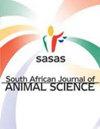土耳其阿伯丁安格斯公牛和荷斯坦弗里西亚公牛的增肥性能、胴体性状和盈利能力
IF 0.6
4区 农林科学
Q3 AGRICULTURE, DAIRY & ANIMAL SCIENCE
引用次数: 2
摘要
本研究的目的是比较土耳其阿伯丁安格斯公牛(AA)和荷斯坦弗里西亚公牛(HF)的增肥性能、胴体性能和生产成本。试验选用平均初始体重为302 kg的10 ~ 12月龄AA和HF公牛各105头。在İzmir的一个开放式棚舍设施中,根据公牛的IBW,将15头公牛分为14个围场。在育成期和育肥期,公牛分别饲喂不同的口粮90天,但在其他情况下保持在相似的条件下。在肥育期结束时,屠宰动物,评估胴体特性、器官重量、肉品质和肉生产成本。在增肥性能方面,AA型公牛优于HF型公牛。AA型公牛背最长肌的极限pH值低于HF型公牛,而AA型公牛的感觉特性高于HF型公牛。AA级公牛的生产成本较高,但收入比饲料成本(IOFC)也较高,这使得AA级公牛的利润更高。因此,可以得出结论,在土耳其,成熟快的牛肉品种公牛,如AA,比HF公牛更有利于肉类生产,HF公牛是乳制品工业的副产品。本文章由计算机程序翻译,如有差异,请以英文原文为准。
Fattening performance, carcass traits, and profitability of Aberdeen Angus and Holstein Friesian bulls in Turkey
The aim of this study was to compare Aberdeen Angus (AA) and Holstein Friesian (HF) bulls in Turkey based on fattening performance, carcass properties, and production costs. In the trial, 105 AA and 105 HF 10- to 12-month-old bulls with a mean initial bodyweight (IBW) of 302 kg were used. The bulls were distributed into 14 paddocks in groups of 15 based on their IBW at an open-shed facility in İzmir. The bulls were fed different rations for the grower and finisher periods for 90 days each, but otherwise were kept under similar conditions. At the end of the finishing period, the animals were slaughtered and carcass characteristics, organ weights, quality of meat, and meat production costs were evaluated. In terms of fattening performance, the AA bulls were superior to the HF bulls. The ultimate pH of the Longissimus dorsi in the AA bulls was lower than in the HF bulls and the sensory characteristics of the AA bulls were higher. Production costs were higher for the AA bulls, but so too were income over feed costs (IOFC), making the AA bulls more profitable. Thus, it might be concluded that beef breed bulls that mature quickly, such as AA, are more advantageous for meat production in Turkey than HF bulls, which are a by-product of the dairy industry.
求助全文
通过发布文献求助,成功后即可免费获取论文全文。
去求助
来源期刊

South African Journal of Animal Science
农林科学-奶制品与动物科学
CiteScore
1.50
自引率
0.00%
发文量
39
审稿时长
>36 weeks
期刊介绍:
The South African Journal of Animal Science is an open access, peer-reviewed journal for
publication of original scientific articles and reviews in the field of animal science. The journal
publishes reports of research dealing with production of farmed animal species (cattle, sheep,
goats, pigs, horses, poultry and ostriches), as well as pertinent aspects of research on aquatic
and wildlife species. Disciplines covered nutrition, genetics, physiology, and production
systems. Systematic research on animal products, behaviour, and welfare are also invited.
Rigorous testing of well-specified hypotheses is expected.
 求助内容:
求助内容: 应助结果提醒方式:
应助结果提醒方式:


